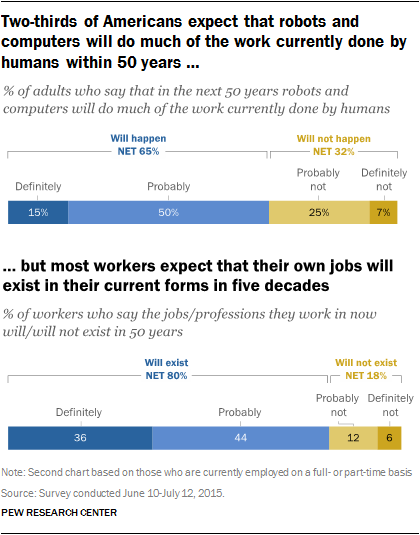In Part I, I started out focusing on truck drivers, because their
vulnerability is easy to understand. But I want to make it clear: even “high-skill”
or “high education” professions aren’t much better. Even doctors
and lawyers
aren’t safe. That noise you’re hearing is the sound of a million Jewish
grandmothers spinning in their graves.
All humor aside, Artificial Intelligence is improving fast.
If anything, our 47% number from earlier is probably a low estimate. Even
assuming that a third of that 47% are able to retrain and secure new employment (a
big assumption), we’re still looking at almost half the population (~31% + the
current unemployment rate of 9%) being indefinitely or permanently unemployed, with the other half constantly
looking over their shoulders for the next advancement to put them out of work.
The fact is, as AI get smarter and smarter, the number of humans who can do
work in any field that is better than the work of computers
approaches zero.
Not that people are aware of it, but then again, humans are
notoriously (and consistently) bad at figuring out the future. Much ink
has been spilled,
trying to overcome implicit human biases. But whether you take our basic optimism personally
or not, people consistently and provably do not recognize that future trends
will inconvenience them as well.
My personal response to seeing data like this is to get
angry, and rail at people for being stupid. But overcoming our innate cognitive
biases in any consistent way is really, really hard, and insulting people doesn’t
actually accomplish anything other than getting people to think that you’re a
kind of evil Vulcan. Also, my unrealistic expectations otherwise demonstrates the
same cognitive fallacy; no one is immune. This is part of why I can never get away from cynicism as practical life
advice.
Regardless, it’s not difficult to see that this future I’ve
sketched out is unsustainable. You can’t leave half the population bored
and poor and expect that things will just work themselves out. People hunger
for purpose and work, and if they can’t find it in society, they’ll find it in
cults, religions, and demagogues. To expect otherwise is foolish; our optimistic
friends will tear it all down before they’ll accept nihilism.
Unusually for this blog, I actually may have part of the
solution to one of the problems I’m outlining. Specifically, part of the answer
for the problem of AI displacing human workers.
Now, I want to make it clear that this entire thing isn’t
some Randian
nonsense critique. I might not have made it clear enough earlier, but I
strongly believe that human lives have meaning and “worth” beyond the simple
monetary calculus of our economic contributions. And while I admit that I’ve
just outlined a very “John Galt”
scenario, with only a small fraction of people able to meaningfully contribute
to the functioning of society, I will not further dignify this
perspective. It is no fault of the majority of humanity that they are not able
to exceed the capabilities of an AI, and until the transhumanists
get their act together, humans are going to keep losing
to Artificial Intelligence.
So, given that there will soon be not enough work for a huge
percentage of people (and therefore not enough income for them to buy food,
housing, or anything else our collective economic machine needs to function), a
new economic paradigm is needed: Guaranteed Minimum Income
(GMI). Or a Basic Income (BI), there’s not really a ton of difference, it’s
more about the implementation.
Assuming you’re not already familiar with it, GMI/BI is just
socialism and safety nets at their finest. Instead of Medicare/social
security/food stamps/any other program, every citizen is paid a living wage by
the government, with no strings or limitations. If done right, this will hopefully
free mankind from the drudgery of boring toil, ensuring that everyone has the
chance to find fulfilling work, or the choice not to.
This is obviously a controversial
position,
with unexplored long term societal consequences. A system like GMI/BI could easily
destroy self-reliance and the will to work on a societal scale; it’s hard to
want to do anything if you don’t have to, and a computer is already doing it
better than you can. If you want a vision of the future, picture a child asking
google for the answer — forever. Technological dependency is already here, and
will only get worse as generations grow up without ever realizing things could
be different.
 |
| Still from WALL·E, 2008 |
But even if GMI/BI does have all those negative side
effects, it’s probably still necessary. The alternative is both unconscionable
and unsustainable; unless the rich plan to retreat to safety
while the rest tear each other apart (hard to do reliably), we need to
prioritize solutions that are good for everyone. Even if (and likely when) we
no longer live in a democracy, policies that completely disregard the general
welfare will still have negative consequences.
I’ve rambled a bit, but my main point is
fairly simple: in a world where humans no longer reliably control the means of production because the labor of humanity is economically negligible, a more egalitarian
way of sharing societal benefits is necessary.

Write about how safety is an illusion
ReplyDeleteEducation needs to change. We need to think more about what people will do. Back to the Farm? Machines will do that too better than people can. A service economy? No money for wars, we will need the funds for feeding the people. How then will we have population control??
ReplyDelete